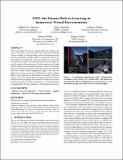Files in this item
LIVE : the human role in learning in immersive virtual environments
Item metadata
| dc.contributor.author | Simeone, Adalberto | |
| dc.contributor.author | Speicher, Marco | |
| dc.contributor.author | Molnar, Andreea | |
| dc.contributor.author | Wilde, Adriana Gabriela | |
| dc.contributor.author | Daiber, Florian | |
| dc.date.accessioned | 2019-10-18T23:34:22Z | |
| dc.date.available | 2019-10-18T23:34:22Z | |
| dc.date.issued | 2019-10-19 | |
| dc.identifier | 260875862 | |
| dc.identifier | cefd2b44-7127-4bc6-b07d-468f2f2ad606 | |
| dc.identifier | 85077045898 | |
| dc.identifier | 000525581300005 | |
| dc.identifier.citation | Simeone , A , Speicher , M , Molnar , A , Wilde , A G & Daiber , F 2019 , LIVE : the human role in learning in immersive virtual environments . in Symposium on Spatial User Interaction (SUI '19) . , 5 , ACM , New York , ACM Spatial User Interaction 2019 , New Orleans , Louisiana , United States , 19/10/19 . https://doi.org/10.1145/3357251.3357590 | en |
| dc.identifier.citation | conference | en |
| dc.identifier.isbn | 9781450369756 | |
| dc.identifier.uri | https://hdl.handle.net/10023/18708 | |
| dc.description.abstract | This work studies the role of a human instructor within an immersive VR lesson. Our system allows the instructor to perform “contact teaching” by demonstrating concepts through interaction with the environment, and the student to experiment with interaction prompts. We conducted a between-subjects user study with two groups of students: one experienced the VR lesson while immersed together with an instructor; the other experienced the same contents demonstrated through animation sequences simulating the actions that the instructor would take. Results show that the Two-User version received significantly higher scores than the Single-User version in terms of overall preference, clarity, and helpfulness of the explanations. When immersed together with an instructor, users were more inclined to engage and progress further with the interaction prompts, than when the instructor was absent. Based on the analysis of videos and interviews, we identified design recommendations for future immersive VR educational experiences. | |
| dc.format.extent | 11 | |
| dc.format.extent | 3527023 | |
| dc.language.iso | eng | |
| dc.publisher | ACM | |
| dc.relation.ispartof | Symposium on Spatial User Interaction (SUI '19) | en |
| dc.subject | Virtual reality | en |
| dc.subject | Learning | en |
| dc.subject | Educational virtual environments | en |
| dc.subject | LB Theory and practice of education | en |
| dc.subject | QA75 Electronic computers. Computer science | en |
| dc.subject | NDAS | en |
| dc.subject.lcc | LB | en |
| dc.subject.lcc | QA75 | en |
| dc.title | LIVE : the human role in learning in immersive virtual environments | en |
| dc.type | Conference item | en |
| dc.contributor.institution | University of St Andrews. School of Computer Science | en |
| dc.identifier.doi | 10.1145/3357251.3357590 | |
| dc.date.embargoedUntil | 2019-10-19 |
This item appears in the following Collection(s)
Items in the St Andrews Research Repository are protected by copyright, with all rights reserved, unless otherwise indicated.

